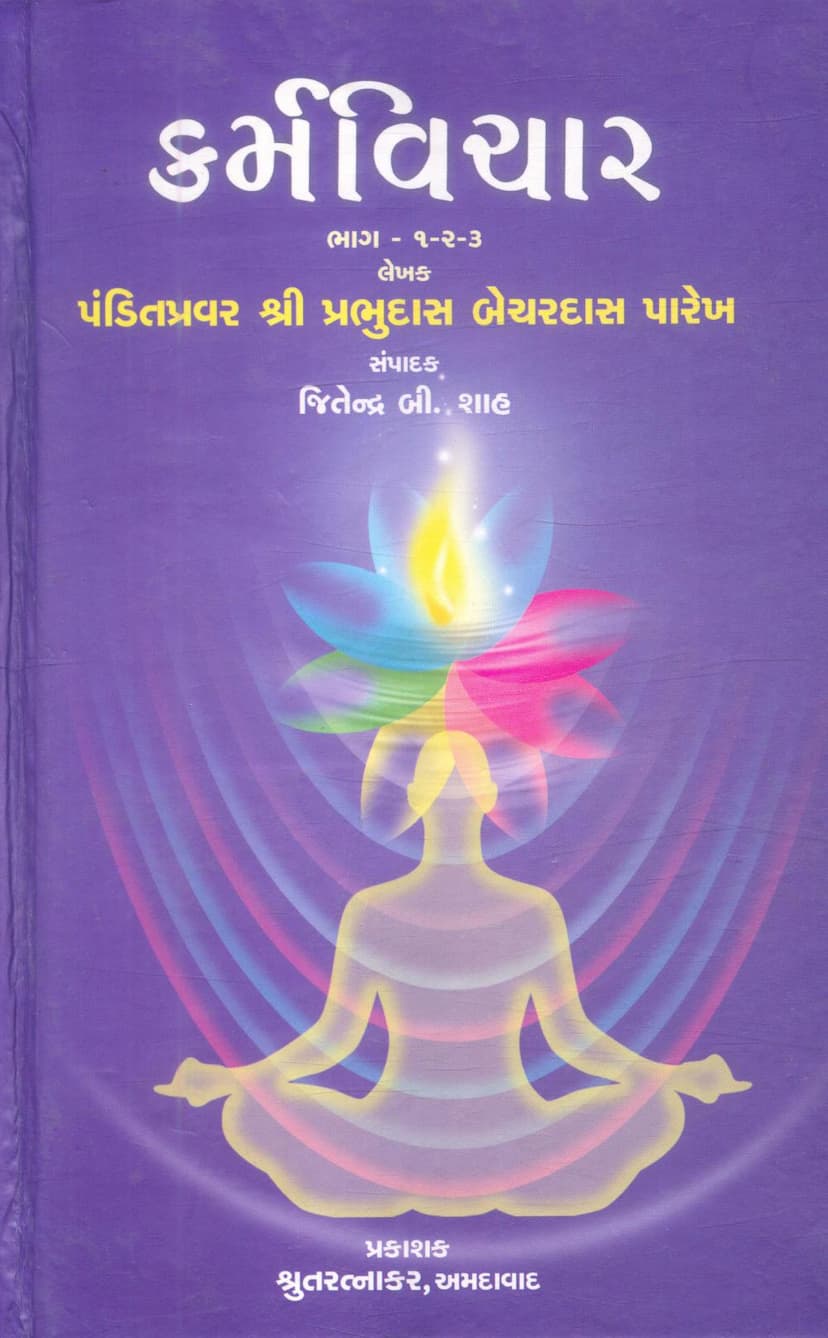Karm Vichar
Added to library: September 2, 2025

Summary
This comprehensive summary of "Karm Vichar" by Pandit Pravar Sh. Prabhudas Bechardas Parekh, compiled by Jitendra B. Shah and published by Shrutratnakar, Ahmedabad, delves deeply into the Jain philosophy of Karma. The book, presented in three volumes, offers a detailed exploration of the concept of karma, which is considered a fundamental contribution of Jainism to the world's philosophies.
Core Concepts and Structure:
The book systematically breaks down the complex topic of karma into three main sections, corresponding to the three volumes:
-
Volume 1: Bandh (Bondage)
- This volume likely focuses on the initial formation of karmic bondage. It begins by addressing the fundamental question of the world's diversity and the underlying causes, identifying karma as the primary reason for the varying experiences of beings (happiness, suffering, strength, weakness, etc.).
- It then proceeds to explain the nature of karma, starting with the basic understanding of the soul (Atma) and its constituents, such as soul-regions (Atmapradesha) and their interaction with subtle particles from the universe.
- Key concepts covered include:
- The nature of existence: Distinguishing between the inanimate (Jad) and the sentient (Chetanya) or soul.
- Soul's omnipresence within the body: The idea that the soul permeates the entire physical form, though not being omnipresent in the cosmic sense.
- Subtle particles (Paramanu) and their combinations (Skandhas): Explaining how the universe and all physical objects are composed of these fundamental, indivisible particles and their aggregates.
- Varganas (Categories of particles): Categorizing these particles based on their potential for interaction and assimilation by the soul, particularly in relation to physical bodies (like Audarik, Vaikriya, etc.).
- Yoga and Adhyavasaya: Detailing the role of mental and physical activities (Yoga) and intentions/affections (Adhyavasaya) in the process of karmic bondage.
- Bandh (Bondage): The crucial concept of how karmic particles (karmic matter) attach to the soul, leading to the formation of karma.
- Time (Samaya): The fundamental unit of time relevant to karmic processes.
-
Volume 2: Satta (Existence/Potential)
- This volume delves into the state of karma once it has bonded with the soul, focusing on its enduring presence and potential for manifestation.
- Key concepts explored include:
- Yogasthanaka (States of Yoga): Different modes or intensities of yoga that influence karmic processes.
- Types of Bandh: Categorizing karmic bondage based on its quality and quantity (e.g., Pradesha Bandh – bondage in terms of quantity of particles).
- Causes of Bandh (Nimitta): Further elaborating on the factors that lead to karmic attachment.
- Properties of atoms: Discussing the inherent qualities of Paramāṇu that facilitate these processes.
- Karmic processes: Detailed explanation of concepts like Nishk, Udayāvalikā (the period during which karma ripens and manifests), and the enduring state of karma (Satta).
- Eight Karmas: Beginning the detailed discussion of the eight primary categories of karma (Jnana-varaniya, Darshana-varaniya, Vedaniya, Mohaniya, Ayushya, Nama, Gotra, and Antaraya).
-
Volume 3: Uday (Manifestation/Result)
- This volume focuses on how karmas, once in a state of existence (Satta), eventually manifest their results (Uday) in the form of experiences and circumstances. It examines the practical implications of karma in the observable world.
- Key concepts include:
- Classification of Life Forms: Analyzing the distinctions and similarities across the spectrum of living beings (Prāṇi-sṛṣṭi), from humans to animals.
- Human and Animal Life: Comparing and contrasting the characteristics of human and animal life, highlighting variations in physical form, senses, intellect, and behavior.
- Life Substance (Jivan-samagri): Exploring the karmic basis for the provision of life-sustaining elements and characteristics.
- Analysis of Body and Soul Activities: Differentiating the roles and manifestations of the physical body and the soul in the karmic cycle.
- Deeper analysis of the Soul: Further exploring the inherent qualities and nature of the soul (Atma).
- Detailed description of the eight karmas: Providing a more in-depth look at each of the eight main karmas, their specific functions, and the types of experiences they generate. This includes detailed classifications of Namakarma (Karma that determines physical form and characteristics) and its numerous sub-categories.
Author's Intent and Methodology:
Pandit Prabhudas Bechardas Parekh, described as a profound scholar, aimed to make the intricate science of Jain karma accessible to a wider audience. He achieved this by:
- Simplified Language: Presenting complex philosophical ideas in a clear and understandable manner.
- Dialogical Style: Utilizing question-and-answer formats or conversational narratives to explain concepts, making them relatable and engaging for the reader, even children.
- Illustrative Examples: Employing relatable everyday examples and analogies to elucidate abstract principles.
- Structured Approach: Organizing the vast subject matter into logical parts and lessons for progressive learning.
- Emphasis on Jainism's Unique Contribution: Highlighting that the Jain dharma's understanding of karma is exceptionally detailed and comprehensive, capable of answering most fundamental questions about existence and suffering.
Relevance and Significance:
The book emphasizes that the karma theory is not merely a belief but a scientific principle within Jainism, capable of explaining the causes behind various phenomena in the universe. It contrasts the depth of Jain karma theory with other Indian philosophical traditions, suggesting that Jainism offers a more complete solution to life's complexities. The re-publication of this work, especially in combined volumes, addresses the scarcity of the original texts, making this profound knowledge available to contemporary seekers. The introductory remarks also touch upon contemporary scientific thought and its limitations in fully grasping spiritual realities without acknowledging the soul.
In essence, "Karm Vichar" serves as a foundational text for understanding the intricate workings of karma according to Jain philosophy, offering a path to comprehending life's diversities and ultimately working towards liberation from the cycle of birth and death.